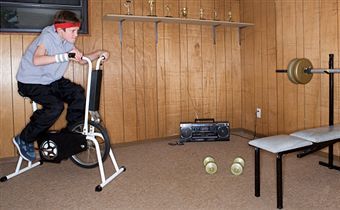
Cork is a beautiful, natural, eco-friendly material that is now popularly being used as a flooring option in different parts of an interior setting. Not only is it aesthetically appealing, and provides a break from the regular wood and tile, cork flooring is also a highly durable material that offers a lot of benefits. It is naturally moisture resistant, is warm so that it provides insulation, and soft. This means it provides sound insulation too. This is why it can be considered a good basement flooring option. A lot of people are concerned about using it in the basement, but here, we tell you why and how you may do so without worrying.
Properties of Cork Flooring
Cork flooring is derived from the bark of the cork tree, and it is believed that this process of removing the cork from the bark is actually helpful for the tree too. Being such an eco-friendly material, why shouldn't it be considered as a good flooring option for your home? Further, it has properties that are most suitable for basements. This includes its resistance to developing mold, and resistance to fire. Cork flooring is also a natural anti-skid material. It can also be used in high traffic areas because it does not get scratched very easily. Experts suggest that this flooring can be used even with pets around the house.
An important point to keep in mind when using cork flooring is that it should be sealed after it has been installed. This is because as naturally resistant it may be, to a variety of assaults that are made on it, this natural resistance can not and should not be relied upon. Therefore, sealing the floor with a polyurethane finish (commonly used on wood floors) is a necessity.
Using Cork Flooring for Basements
A basement is a highly damp and moist area, which is why most people are concerned about the use of cork which is a natural material, in basements. However, there are ways in which it can be safely used in basements and provide all its benefits. When using cork flooring in the basement, keep in mind the following tips:
- Your basement should be checked for any cracks that can allow for water seepage and result in leakages. These cracks should be sealed and the basement should be completely dried before you install any kind of floor on it.
- Cork flooring cannot be installed in a basement without the installation of an appropriate moisture barrier and sub-floor. It has already been mentioned earlier that the natural resistance of cork to mold, mildew, and moisture should not be taken for granted. It is important to take all necessary precautions against these, before installing cork flooring in your basement.
- Experts suggest the installation of floating cork floor tiles in the basement, rather than those that are glued to the floor. After installing a moisture barrier, i.e. polyethylene (6 mil film), the floating floors may be fixed on the basement floor. This will provide appropriate protection from moisture.
- To use glue down cork floor tiles, a plywood sub floor above the moisture barrier is essential, upon which the tiles can then be adhered with an adhesive.
- Following the installation of cork flooring, a coat of polyurethane should be applied on it before using any molding to finish the floor. It is best to get this job done by a professional so that the coat is even and is thoroughly used to keep the flooring protected.
By taking the appropriate measures, cork flooring can be safely installed in basements and can last for a long time. This flooring material is warm and soft, and will also add value to your basement, in terms of visual appeal. If you are still concerned about this, then it is advisable to talk to an expert who will tell you about all the pros and cons of cork flooring. You will be able to make a more informed decision in such a case. Further, an expert will check your basement to evaluate how damp it is or can get, and will then tell you whether this flooring material will be suitable for it or not. Do consult with an expert before you install this flooring, so that you get the best results in the end.





